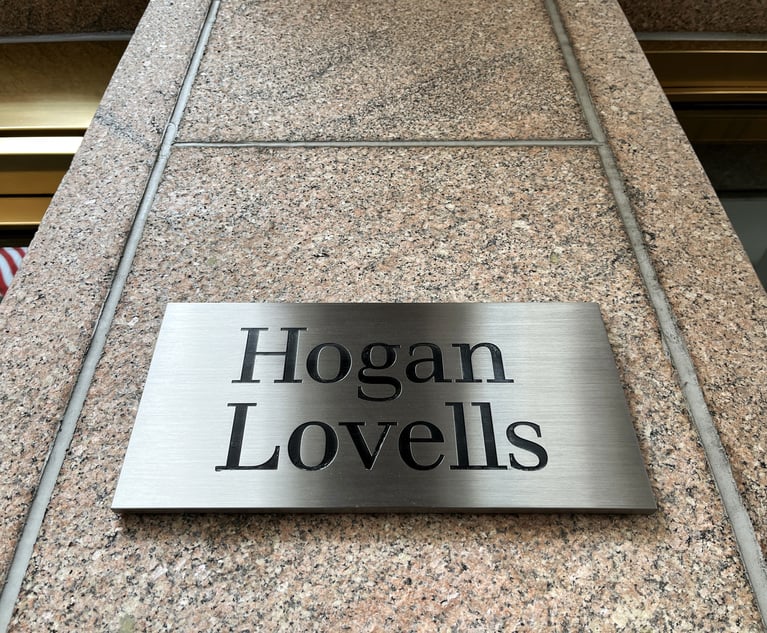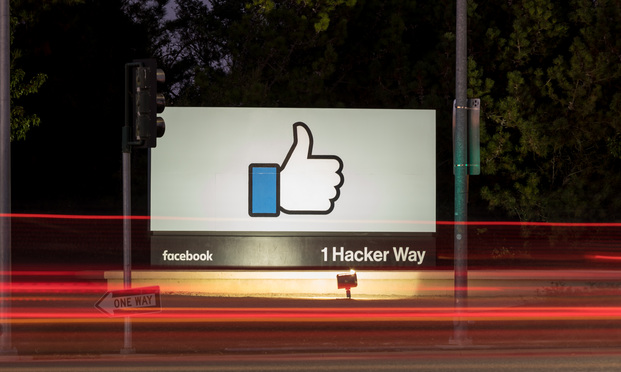French High Court Rejects Law Restricting Online Content
A new law requiring online platforms such as Facebook to take down objectionable content within 24 hours poses a disproportionate risk to freedom of expression, France's Constitutional Council has ruled. But the ruling leaves intact the body of French law that prohibits hate speech, a category that includes racial slurs, denial of the Holocaust, and incitement to violence.
June 22, 2020 at 03:03 PM
4 minute read
A new French law that would have required such social media platforms as Facebook to take down objectionable content within 24 hours has been rejected by France's Constitutional Council as a disproportionate response to the proliferation of hate speech online.
The ruling is a limited victory for free-speech advocates and a temporary reprieve for Facebook and other platforms, which under the new law would have faced heavy costs for real-time mediation of content and heavy fines for failure to comply, media lawyers told Law.com International.
France's Conseil Constitutionnel, the equivalent of the Supreme Court, ruled on June 18 that the new Loi Avia, which had passed both houses of the French parliament, would infringe "freedom of expression and communication" in a way that was "not appropriate, necessary and proportionate to the goal being pursued."
The ruling leaves intact the body of French law that prohibits hate speech, a category that includes racial slurs, denial of the Holocaust, and incitement to violence.
But it sends the government back to the drawing board to find a more nuanced way to make platforms such as Facebook and Twitter, and their powerful corporate owners, responsible for the content posted by users.
"The intentions behind the law were good," said Basile Ader, a media law partner at August Debouzy in Paris. "But the Constitutional Council made it clear that these goals should be achieved in a measured, proportionate way—not with a hatchet."
The law and its potential application to Facebook made headlines in France earlier this month after a French website published screen grabs of racist comments that appeared in a private Facebook group for 8,000 law enforcement agents. The publication came amid protests in France and around the world of the killing of men and women of color by police officers.
The French interior minister, Christophe Castaner, said the government would sue to compel Facebook to divulge the names of the people posting the content so that they could be prosecuted for public hate speech. Under French law, private social media groups are considered public once they reach a certain size, and law enforcement officers are held to a higher standard of public expression.
Under the Loi Avia, Facebook would have been compelled to take the comments down, Ader of August Debouzy said.
"But with the core of that law now rejected, the situation is more complicated," he said. "The government will need to find another way to make the platforms take more responsibility."
The approval and disapproval of the Loi Avia highlight not only the intellectual challenge of policing free speech in a democracy, but also the technical challenge of policing social media platforms where communications are instantaneous and round the clock, lawyers said.
In its ruling, the Constitutional Council noted the provisions of the new law that would have required platforms to take down objectionable content within 24 hours or face heavy fines.
Julien Guinot-Deléry, a media law counsel at Gide Loyrette Nouel, explained that in order to react that quickly, the platforms would either have to set up 24/7 content review by human moderators or get any post-publication complaints before a judge within 24 hours, the latter an impractical and unlikely outcome, he said.
What was more likely, he said, is that the platforms would set up an automated system to immediately take down any content that drew a complaint.
It is this outcome, Guinot-Deléry said, that raised the possibility before the constitutional body that the law, as written, posed too great a risk of overregulation.
"When you're talking about a cornerstone issue like freedom of expression, it's difficult to see how you can neglect the human element," he said.
This content has been archived. It is available through our partners, LexisNexis® and Bloomberg Law.
To view this content, please continue to their sites.
Not a Lexis Subscriber?
Subscribe Now
Not a Bloomberg Law Subscriber?
Subscribe Now
NOT FOR REPRINT
© 2025 ALM Global, LLC, All Rights Reserved. Request academic re-use from www.copyright.com. All other uses, submit a request to [email protected]. For more information visit Asset & Logo Licensing.
You Might Like
View All
Squire Patton Boggs Hires 7-Lawyer Team to Beef Up ESG Practice in Brussels
2 minute read
Hogan Lovells Germany Partner Exits for Willkie After Just a Few Months
2 minute read
Norton Rose Fulbright, ECIJA and Others Add Hires in Southern Europe
Law Firms Mentioned
Trending Stories
- 1No Two Wildfires Alike: Lawyers Take Different Legal Strategies in California
- 2Poop-Themed Dog Toy OK as Parody, but Still Tarnished Jack Daniel’s Brand, Court Says
- 3Meet the New President of NY's Association of Trial Court Jurists
- 4Lawyers' Phones Are Ringing: What Should Employers Do If ICE Raids Their Business?
- 5Freshfields Hires Ex-SEC Corporate Finance Director in Silicon Valley
Who Got The Work
J. Brugh Lower of Gibbons has entered an appearance for industrial equipment supplier Devco Corporation in a pending trademark infringement lawsuit. The suit, accusing the defendant of selling knock-off Graco products, was filed Dec. 18 in New Jersey District Court by Rivkin Radler on behalf of Graco Inc. and Graco Minnesota. The case, assigned to U.S. District Judge Zahid N. Quraishi, is 3:24-cv-11294, Graco Inc. et al v. Devco Corporation.
Who Got The Work
Rebecca Maller-Stein and Kent A. Yalowitz of Arnold & Porter Kaye Scholer have entered their appearances for Hanaco Venture Capital and its executives, Lior Prosor and David Frankel, in a pending securities lawsuit. The action, filed on Dec. 24 in New York Southern District Court by Zell, Aron & Co. on behalf of Goldeneye Advisors, accuses the defendants of negligently and fraudulently managing the plaintiff's $1 million investment. The case, assigned to U.S. District Judge Vernon S. Broderick, is 1:24-cv-09918, Goldeneye Advisors, LLC v. Hanaco Venture Capital, Ltd. et al.
Who Got The Work
Attorneys from A&O Shearman has stepped in as defense counsel for Toronto-Dominion Bank and other defendants in a pending securities class action. The suit, filed Dec. 11 in New York Southern District Court by Bleichmar Fonti & Auld, accuses the defendants of concealing the bank's 'pervasive' deficiencies in regards to its compliance with the Bank Secrecy Act and the quality of its anti-money laundering controls. The case, assigned to U.S. District Judge Arun Subramanian, is 1:24-cv-09445, Gonzalez v. The Toronto-Dominion Bank et al.
Who Got The Work
Crown Castle International, a Pennsylvania company providing shared communications infrastructure, has turned to Luke D. Wolf of Gordon Rees Scully Mansukhani to fend off a pending breach-of-contract lawsuit. The court action, filed Nov. 25 in Michigan Eastern District Court by Hooper Hathaway PC on behalf of The Town Residences LLC, accuses Crown Castle of failing to transfer approximately $30,000 in utility payments from T-Mobile in breach of a roof-top lease and assignment agreement. The case, assigned to U.S. District Judge Susan K. Declercq, is 2:24-cv-13131, The Town Residences LLC v. T-Mobile US, Inc. et al.
Who Got The Work
Wilfred P. Coronato and Daniel M. Schwartz of McCarter & English have stepped in as defense counsel to Electrolux Home Products Inc. in a pending product liability lawsuit. The court action, filed Nov. 26 in New York Eastern District Court by Poulos Lopiccolo PC and Nagel Rice LLP on behalf of David Stern, alleges that the defendant's refrigerators’ drawers and shelving repeatedly break and fall apart within months after purchase. The case, assigned to U.S. District Judge Joan M. Azrack, is 2:24-cv-08204, Stern v. Electrolux Home Products, Inc.
Featured Firms
Law Offices of Gary Martin Hays & Associates, P.C.
(470) 294-1674
Law Offices of Mark E. Salomone
(857) 444-6468
Smith & Hassler
(713) 739-1250










